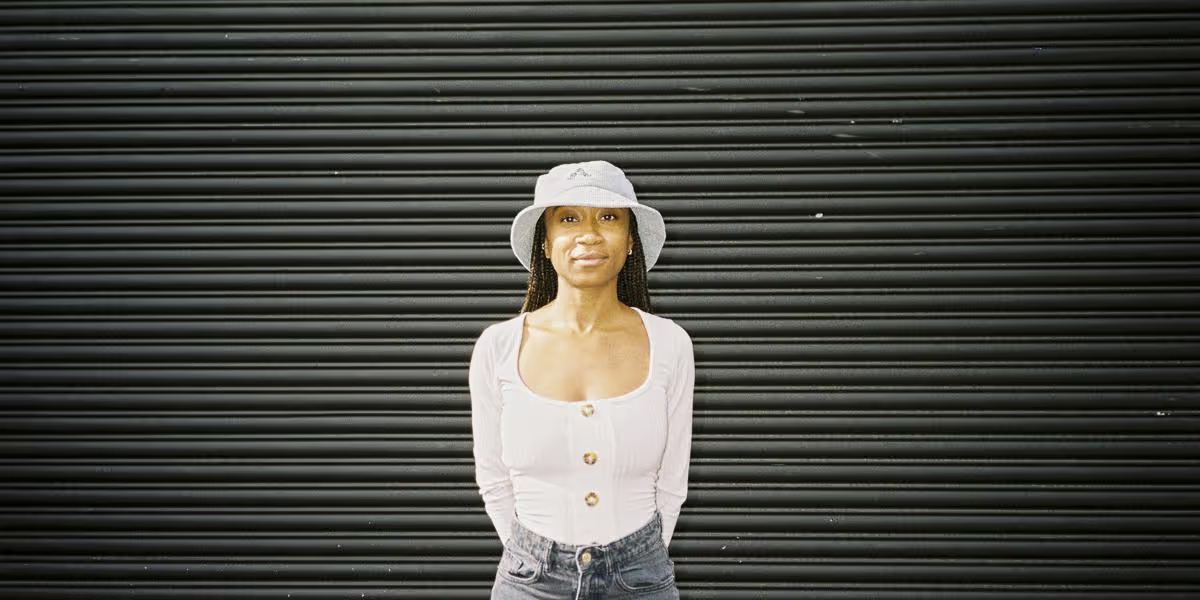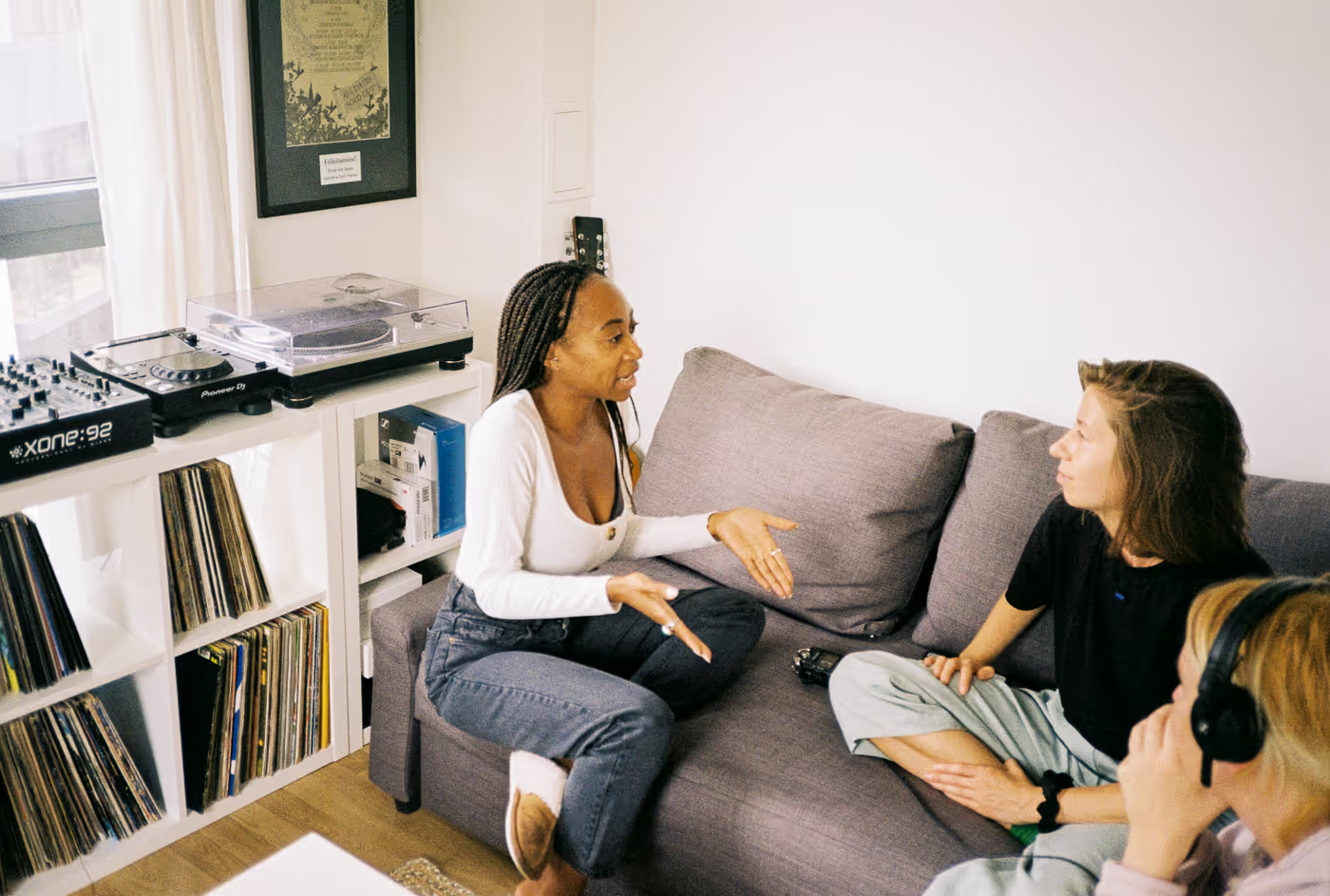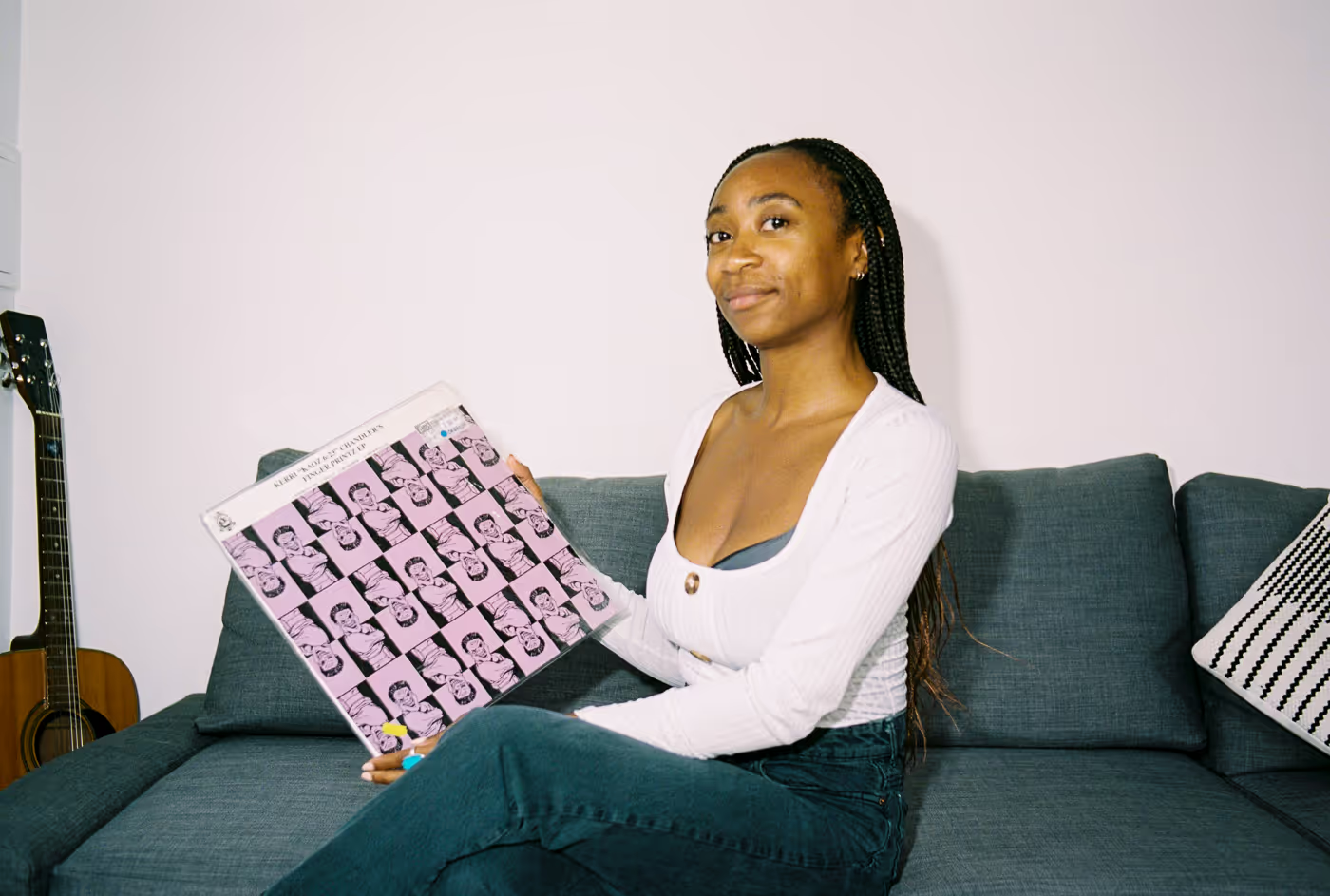





Interview by Blurbs
Video & Photo by Lukas Turcksin
Keytrade and Horst share DIY entrepreneurship as a common denominator. With ‘Their Way’ they inspire their shared philosophy through a content series. ‘Their Way’ offers the stories of DIY entrepreneurs at the forefront of art, architecture and music. We delve into the messy, yet inspiring and insightful process of entrepreneurship. We celebrate and feature compelling stories, challenging initiatives and examples of integrity from around the world.
Nestled among the shady trees and houseboats of Regent’s Canal in a residential corner of Hackney Wick, Horst sat down with Niks, who is the co-founder slash ‘dot connector’ at Black Artist Database, formerly known as Black Bandcamp—today known affectionately as B.A.D. In our conversation, we retraced the steps back to that fateful moment of collective action that resulted in the world’s first global database of Black musicians, artists, DJs, and creatives. Niks, who is also a rising DJ talent, is using the platform to demonstrate the importance of seizing momentum, the Black community’s ability to generate beauty and healing from trauma, and the quiet power of waking up and asking, “How can I help?”
Horst: Nice to see you, Niks! Could you introduce yourself and tell us a bit about what led you to London and how you became active in the electronic music scene?
Niks: My name is Niks and I'm actually from southeast London but currently living in Hackney Wick. I am the co-founder of Black Artist Database, formerly known as Black Bandcamp. I'm a DJ, a speaker, and I'm also a contemporary-trained dancer. Pre-pandemic, I really immersed myself in the music industry while I was living in Bath. Then I came back to London to work in radio: Capital, Capital Xtra, Class FM, Smooth Heart, LBC.
I was also a door girl. I used to work for the Columbo Group, so XOYO, Phonox, Blues Kitchen, the Jazz Cafe to name a few. Every Friday and Saturday I was at the door doing the guest list, sometimes doing artist liaison. Being on that side of the scene was when I started thinking seriously about going deeper into music.
As for DJing, my first gig was actually in 2015 at a venue called Moles. In the nineties, people like Carl Cox and FatBoy Slim used to play there a lot. It was my first time playing in front of people. But it’s also through radio that I got more connected to DJing. I'm still really good friends now with a lot of the people that did residencies when I worked at XOYO, like Dusky and Tasha. My background in contemporary dance has been another unexpected gateway into the electronic music scene. There are three people who I'm still friends with from dance: one is Tsha's manager. One is a professional dancer who works with a lot of queer movements and parties. And one is a leading pole dancer in the UK. Everyone is doing their thing!
I have to mention that I come from a musical household. My dad played guitar in a band and brought me to Glastonbury when I was a kid. If you see kids at a festival, especially with dance music, some people are like, “Oh, why is there a young child here?” I would say, “No, that's the whole point!”

Horst: Sharing what you love with your children is important! Let's dive into Black Artist Database, formerly known as Black Bandcamp. You have a very well-written and informative backstory on the B.A.D. website. Could you tell us more about how Black Bandcamp evolved into B.A.D.?
Niks: A group of friends and I reacted very spontaneously. Myself and some DJs and producers, including Ceci (CCL), Hermione (rRoxymore), (Ines) Violet, Melissa (Doc Sleep) and Zach. It was the first week of June. There's a virus. Black people are being murdered. Genuinely, we were very distressed by it. What could we do? After the George Floyd incident, I felt that my friends and I were sitting in our European cities feeling quite removed, but obviously emotionally not removed because what was happening was not right.
White supremacy as a system is alive and kicking, it's affecting people, and it's terrible. People are being murdered because of this system. I'm not in a position to go and lobby MP’s and politicians and governments, but we operate in a dance community in Europe where there are a lot of festival headliners and 90% of them are white men, but they're not the ones that started this sound or this culture. What can we do? That's where the idea of Black Bandcamp came from. From their Bandcamp Fridays when they waive their fees – we wanted to showcase Black artists around that time. We created a spreadsheet called BLM Bandcamp. I first put it on my socials and then people shared it in WhatsApp groups. When we went to sleep we had like 30 or 40 names in there to get the ball rolling. The next day we woke up and there were like 500 or 600 names on the sheet.
When we opened it, I'd never seen so many anonymous animals in a Google spreadsheet! Wow! Then I went to my Instagram and the post had over a thousand likes, shares, and hundreds of comments. It was so moving because there was a global shared experience where people all over the world felt the same way.
That was quite emotional because it wasn't planned. This is why I call myself co-founder because I didn't put all the 4,000 people in there. The community did. I put maybe 20 names on there, we're currently at 4,000, the other 4,000 names were people I've never even met. It’s also why we call ourselves a community-based platform – it was created by the global dance community. We captured momentum and utilized it. That's what it was. With these progressive movements, it’s important to capture the shared, unified, emotional feeling at that specific moment in time.
This shared unified community feeling is still there because that's what got a lot of people through the last two years. This is how B.A.D. started. I wish I could meet all the people that were in it and be like, thank you. It's funny because there were tier one DJs reaching out with a list of people, or just saying thank you. Then Resident advisor, DJ Mag, Mixmag, ID, Dazed & Confused had written articles about the spreadsheet. Then came July Bandcamp Friday, they were waiving a hundred percent of their fees to the NAACP, the National Association for the Advancement of Colored People, in America. At that point I was really worried that the spreadsheet might crash, or that someone might accidentally delete it. I have two friends who are developers, so I asked them to make a locked site that holds the data, but people can still submit and add to it. That's when it became Black Bandcamp dot info.
We rebranded to Black Artist Database because it grew so much and it was clearly beyond Bandcamp. We integrated with Bandcamp’s backend API, and then global digital music platforms such as; Juno Records, and Juno Download hit us up to do the same. Actually there's a few more in the pipeline. As for the name, it’s an artist database for Black people, B.A.D. sounds and looks cool. B.A.D.
"This shared unified community feeling is still there because that's what got a lot of people through the last two years. This is how B.A.D. started. I wish I could meet all the people that were in it and be like, thank you."

Horst: Can you talk about the other members of the team? Who are they, what are they up to?
Niks: Yes, right away I realized “Wow, we need a team.” Kay Ferdinand is the first person that I reached out to, I know him from university. Kay is the other director of B.A.D. who overlooks all of our content and events. Our most recent event was at Village Underground, we had AceMoMa come all the way from New York. We had OK Williams, Emerald, and myself. He's the person behind the scenes, grafting it all together.
Our Voices mix series and editorial outlets are managed by Tanya Akinola. She also has a background in label management, which is something we are actually working on for Q2 next year. Then we have Joseph Kamaru (KMRU), who was there from the beginning. Kamaru (KMRU) is a Berlin-based sound and field recording artist. Charnnie Frimpong (big sister to Australian DJ C FRIM) overlooks all of our social media, PR and communications. When we rebranded from Black Bandcamp to B.A.D.
Christine Kakaire is another really great individual, she used to be an RBMA host. She launched and leads the creative database of B.A.D. During the pandemic, we were receiving a lot of emails from Black creatives who said, “I'm being asked to write a think piece by this publication on a topic which evolves around Black trauma.” This was at the peak of protests in 2020 when a lot of editorial platforms were then like, “Crap, we need to start writing about Black things. Oh, we don't have any Black staff to write about it.” We got a lot of this feedback and we thought, the artist database is a free, open resource that you can tap into to hire and connect with Black artists. Maybe we can do the same for creatives.
We have Oscar Atanga who drives our smaller collaborations, like our monthly Ableton masterclasses. He leads the strategy behind these efforts. There's Miles George, he is our visual design lead. He designs the website, the logo, all of our assets you see across our socials and all the merch. Rushell Morara, who is from Nairobi, Kenya, heads up the database with two members, Lauryn Njeri and Karambu Linah. People submit themselves into the database, then submissions are reviewed and maintained. Currently they're working with a Nairobi-based platform to just help us further showcase the database beyond the UK and Europe. At the moment, we're about 60% EU/UK and 40% rest of the world, which feels quite unbalanced. It should be 60% African and then 40% rest of the world, as it's a Black Artist Database, this balance needs to be addressed. There are so many Black artists in diasporic countries that need to be spotlighted and recentered. We want to take it to the next step to ensure that we are not becoming a Eurocentric resource, because it's easy to do that.
I am more focused on strategy and front-facing things like panels and talks. I do a lot of long term planning and following up. I’m the dot connector!
"Now, we're tapping into so many people from different parts of the world, there's a nice connectedness in the international electronic music community. Everyone's on the same page of wanting to elevate one another."
Horst: How does the database grow? Do people always put themselves in or do you actively seek out artists to put in?
Niks: It's a combination of artists who will list themselves, and some people input other artists. In fact, a lot of the entities we work with, like AIM, BPI, Arts Council, are notified that we exist, then they are sending the resource out to their networks. We work with labels like K7, asking them to share it with the sublabels that they work with. From what I see, the database is predominantly growing through word of mouth and networking. Now, we're tapping into so many people from different parts of the world, there's a nice connectedness in the international electronic music community. Everyone's on the same page of wanting to elevate one another.

Horst: Can you share more about some of the B.A.D. initiatives you’re excited about?
Niks: We have monthly Ableton production masterclasses, which we started last year in August. We are a global resource thankfully, but that means most of our events happen online so that everyone can attend. We have very reputable producers. We had Lorraine James, we had rRoxyMore, we had KMRU, we had Acemo, we had Kessler. We've had Suzi Analogue. They deliver a two hour workshop in a production area of their choice. It's great because it's free, you just sign up and then you attend the class. We want to give back–we try really hard to make things free and accessible.
We also have cool events! We started running the parties last year in October. We had our first party at the Colour Factory which is one of three Black-owned venues in London. They reached out to us and said, “We love what you're doing. We want to give you the space for free.” Again, it's all about the community. If they didn't give it to us for free, we probably wouldn't be able to throw them in the first place. The first one was so touching because so many people came up to us and said, “I've been following you guys for the past year and a half. Thank you. Thank you.”
Contentwise, we put out monthly mixes as part of the mix series. They're called B.A.D. mixes and Eddie Fowlkes from Detroit graced our first one. It’s crazy that we can hit up people that we would never think we could hit up. We’ve had Mr. Redley, KMRU, Shy One … It's another way to showcase Black artists through a mix, which people can access anywhere around the world. We also do a Voices podcast, which is a platform to allow Black folks from perhaps a previous generation to be heard in a safe space away from larger platforms. Many Black people don't necessarily feel comfortable talking about everything that they've been through in their career with mainstream platforms. We've had A Guy Called Gerald, we've had Lakuti, we've had DJ Paulette, we've had Smokin’ Jo. In the Voices episode, A Guy Called Gerald talked about how he never got a single penny from Voodoo Ray. That he was a young, Black male that was taken advantage of. It's about telling the side of stories that people won't necessarily hear from legends. Another example is DJ Smokin’ Jo, she is the only woman that has been the DJ mag #1. That was in 1991. If you listen to our Voices podcast, there's some really interesting stories that have never been shared. If we're able to archive and document these narratives in a safe home, then it’s there for life. I always think of someone like K. Hand. If she was still alive and there was an audio podcast of her life, how rich would that be? With Voices, we seek to archive these narratives.

Horst: We noticed that you're also working with Patreon. Can you maybe tell us about that experience?
Niks: Our relationship with Patreon came about from Christine Kakaire who drives our creative database. Again, the community, information sharing. Christine came to me and said, “I've worked with this person at Patreon. I think you two have some synergy, you should connect with them.” Now we have a Patreon, and our collaboration with them is great. We collaborate on panels, events, and merch as well.
Horst: We’re getting towards the end of our interview. Could you tell us your favorite memory from the B.A.D. journey?
Niks: We’ve been around for 2 years and 3 months now, and we’ve had so many incredible moments along the way. One that stands out for sure is when we rebranded from Black Bandcamp to B.A.D. For us it was a way of telling the world that this is what we're doing, and we're not going anywhere. The database grew exponentially, we were featured in Billboard, and it took us to the next level in so many ways.
A memory that stands out for me personally was when an artist reached out to tell us that since they were put in the database, their music sales were 6x higher on Bandcamp Fridays than before the database existed, and they attributed that to us. It’s so rewarding to see the real impact that the database can have on artists' lives.
Horst: If you could give a piece of advice to other people starting a project in music and/or social justice, what piece of advice would you give?
Niks: Generally, these formations happen organically and unplanned - usually in a “cause and effect” format. There will be such an overwhelming and collective feeling towards something that results in the natural coming together of like minded individuals. Every revolution that has happened was not “planned” per se, but again, the result of a “cause and effect”.
